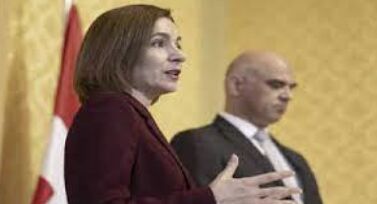Moldova's President Sandu Takes Stand Against Russian Influence in Church Affiliation: A Crucial Step Towards European Integration
Moldova's president, Maia Sandu, weighs in on dispute between rival Orthodox churches over Russian influence. Church affiliation key to country's goal of European integration and independence from Russia.
Moldova's president, Maia Sandu, has weighed in on the ongoing dispute between the country's two rival Orthodox churches over Russian influence. With churches playing a significant role in Moldova's history, the issue of which church to align with is closely tied to the country's larger goal of European integration. At present, neither of Moldova's Orthodox churches are independent. One church answers to Moscow, while the other answers to Bucharest. However, the link to the Russian Orthodox Church has been making the church unpopular among parishioners, as it is seen as supporting Russia's actions in Ukraine.
President Sandu emphasized that the church should operate in the best interest of the state and its citizens, working towards the country's main goal of peace and European integration. She believes that the church and state should be separate entities, but they should both be focused on the country's aspirations. In a letter from the head of the largest Orthodox Church to its Russian parent church, the Moldova Metropolis expressed concern about its decreasing popularity due to its association with Moscow. Additionally, the letter hinted at Moldova's eventual unification with Romania, which Russia has failed to understand.
The rivalry between the two churches escalated further when the head of one church defrocked six priests for joining its rival. This move was criticized as absurd and ridiculous by the rival church, which accused its opponent of supporting Russia's notion of a sphere of influence beyond its borders. The relationship between Moldova and Russia has long been complex, with cultural influences from both Russia and Romania being prevalent in the country. However, the ongoing war in Ukraine has raised concerns among Moldovans, with President Sandu openly condemning the conflict and accusing Russia of attempting to remove her from office. Her administration has also actively pursued EU membership as a means of securing Moldova's place in Europe.
Some experts believe that the criticism of Moscow by the Russia-linked church is an attempt to secure autocephaly, or independence, from the Russian Orthodox Church. A similar situation occurred in post-Soviet Ukraine, where a Kyiv-based church sought independence, but it took over 25 years to achieve. As Moldova continues to navigate its path towards European integration, the role of the church and its relationship with Russia will be critical. The Moldovan Orthodox Church recognizes that remaining under the authority of the Russian Orthodox Church will result in a loss of influence and perpetuate its marginalization.
Many view the Russian church as more of a propaganda and ideological organ of the Kremlin rather than a legitimate religious institution. Moldova's pursuit of European integration hinges on resolving the divisive issue of church affiliation. As the country seeks to break free from external influences and assert its own identity, the church's role will be vital in shaping its future. President Sandu's stance reflects the broader sentiment in the country, emphasizing the need for unity, peace, and alignment with European values.




